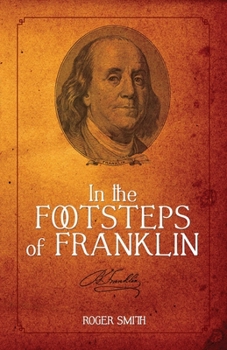In the Footsteps of Franklin: Advice on Living an Exemplary Life, Building a Successful Business, and Leaving a Permanent Legacy
Benjamin Franklin wrote the first American self-help and career advice book. He laid the groundwork for how to run a successful business, live an exemplary life, build a personal fortune, and leave a permanent legacy.
His Autobiography has been in print for almost 200 years. It is the basis for hundreds of business books that followed. Franklin applied his powerful mind to the creation of a successful business, securing the independence of a new country, developing strong foreign relations, and explaining the principles of a successful and prosperous life. In the Footsteps of Franklin brings out the key personal, professional, and social principles that Benjamin Franklin prescribed in his Autobiography, The Way to Wealth, Poor Richards's Almanac, and many other writings.
In the Footsteps of Franklin should be at the top of your own list for Building a Better Life. As Franklin himself said, "They that won't be counseled can't be helped."
This is an inspiring exploration of the life and legacy of one of America's founding fathers, Benjamin Franklin. This compelling narrative not only delves into Franklin's extraordinary journey from humble beginnings to becoming an iconic statesman, inventor, and philosopher, but also serves as a guide for self-improvement, reflecting on the virtues and habits that shaped his path to greatness.
Benjamin Franklin's story is a testament to the power of self-education and self-discipline. Born the son of a Boston candle maker and one of seventeen children, Franklin's formal education concluded at the tender age of ten. Yet, through relentless self-improvement and an insatiable thirst for knowledge, he rose to become a distinguished figure, earning honorary degrees and the title of the "Greatest Philosopher of the Century."
Franklin's career was as diverse as it was successful. As a businessman, he made his mark as a tradesman and printer, empowering others in the profession while amassing substantial wealth, which allowed him to retire at 42. His retirement, however, was anything but restful. Franklin dedicated himself to public service, contributing significantly to the civic infrastructure of his community by establishing institutions that are cornerstones of modern society, like the local police force, fire company, and the University of Pennsylvania.
His inventive spirit led to creations such as the Franklin stove, bifocal spectacles, and groundbreaking experiments with electricity, cementing his status as a legendary inventor. Yet, it was his prowess with the pen that earned him enduring fame. Franklin's writings, including "The Autobiography of Benjamin Franklin," "Poor Richard's Almanac," and "The Way to Wealth," continue to resonate with readers worldwide.
The core of this book, however, is Franklin's moral compass-his conscious effort to live by a set of virtues that he meticulously outlined. At 26, he embarked on an ambitious quest for moral perfection, crafting a chart with 13 virtues. He tracked his progress daily, marking his missteps with a red dot and focusing on one virtue per week, striving to improve upon it. This methodical approach, though not leading to absolute perfection, significantly enhanced his character and happiness.





